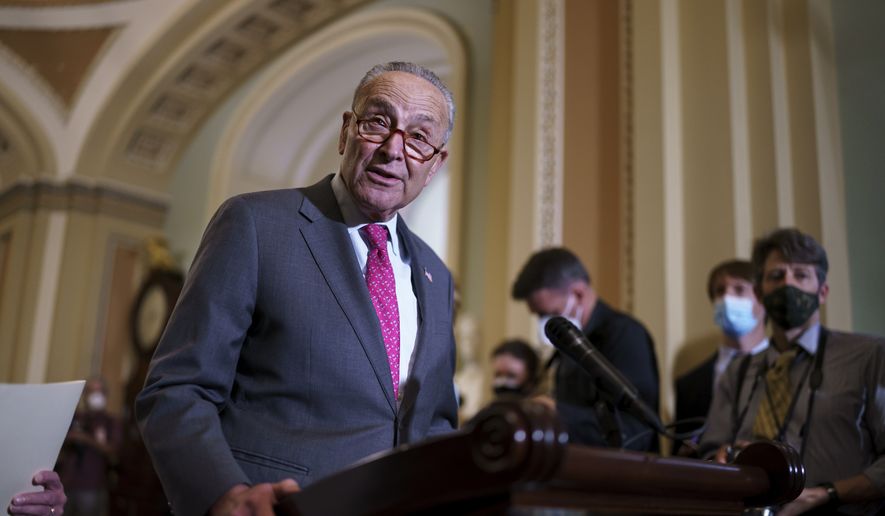The Senate Foreign Relations Committee voted Wednesday to repeal 1991 and 2002 Authorizations for the Use of Military Force, which provided the legal justification for the Gulf War and the 2003 invasion of Iraq.
The 14-8 committee vote follows the House vote in June on two separate measures to repeal the decades-old authorizations in June.
The measure now proceeds to the Senate floor. Senate Majority Leader Charles E. Schumer, New York Democrat, said he supports the measure and called Wednesday for a floor vote by the end of the year.
“Americans, frankly, are sick of endless wars in the Middle East,” Mr. Schumer said Wednesday. “Congress simply has to exert more authority over matters of war and peace as we all know the Constitution prescribes.”
The repeal of the AUMFs would be the first rollback of presidential war powers since the Sept. 11, 2001, terrorist attacks.
The committee met twice to consider the measure before taking Wednesday’s vote at the request of several Republican members.
In July, the committee heard testimony from State Department and Pentagon representatives in a closed session.
On Tuesday, the committee heard testimony on the measure from Deputy Secretary of State Wendy Sherman and legal advisers from the Defense and State departments in an open session.
Ms. Sherman reiterated the Biden administration’s support for the repeal in her testimony.
“President Biden is committed to engaging with Congress on questions of war and peace, and to being transparent about when, where, why and how the United States uses military force,” Ms. Sherman told the committee. “I want to state clearly that the Biden-Harris administration believes the 2002 authorization for the use of military force against Iraq has outlived its usefulness and should be repealed.”
President Biden has previously registered his support for appealing the authorizations, arguing that they are outdated.
The administration also has strayed from previous administrations’ tendency to lean on the 2002 AUMF for engagements in the region, citing Article II of the Constitution for airstrikes on Iranian-backed militia fighters in Iraq and Syria in February and June.
Although lawmakers in both parties largely agree that the authorizations are outdated, some Republicans argue that the repeal could send the wrong message amid continued Iranian aggression in the region.
“If we repeal the Iraq authorizations, we need to put something back on the table that is modern, that’s tailored, and that’s limited so we can message clearly to our allies in the Middle East, as well as to our adversaries like Iran, that the United States remains resolved to protect our nation’s interests,” Sen. Bill Hagerty, Tennessee Republican, said Wednesday.
Mr. Hagerty proposed an amendment that would have repealed the 1991 and 2002 authorizations while authorizing the president to defend against, and respond to, attacks by terrorists and state sponsors of terrorism who are operating in Iraq.
“I have approached this question — sustain or repeal — with much consideration and reflection, and believe strongly that it is past time for the AUMFs to be repealed, but I cannot in good conscience vote to do so when the Biden administration is actively appeasing the Iranian regime, including ignoring escalating attacks on Americans and allies while offering the Iranian regime tens of billions in sanctions relief in nuclear negotiations,” he said.
Mr. Hagerty’s amendment received Republican support, but failed to pass in committee. He said after the vote he will continue to press for the measure when the Senate takes up the vote later this year.
“I offered to my colleagues what I believed to be a better, more constructive way for Congress to reassert our war powers and replace them with a more strategic approach,” he said. “Despite my amendment not being agreed to today, I intend to offer it on the Senate floor when the measure to repeal the Iraq AUMFs is brought up for a vote. It is time for Congress to end the endless wars, but ensure the president — any president — remains empowered to protect American lives and interests.”
• Joseph Clark can be reached at jclark@washingtontimes.com.




Please read our comment policy before commenting.